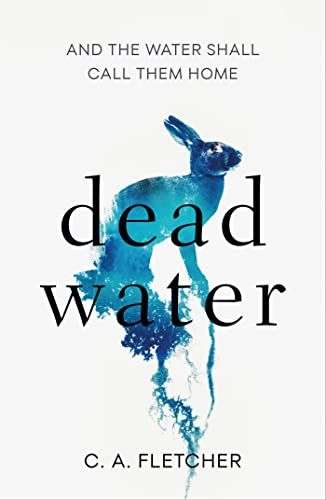We’ve implemented some new protocols around sending us messages via this website. Please email website “at” britishfantasysociety “dot” org for any issues.

For all things fantasy, horror, and speculative fiction
-
Announcement:

DEAD WATER by C.A. Fletcher from @orbitbooks
DEAD WATER by C.A. Fletcher.
Orbit Books. h/b. £18.99.
Reviewed by Elloise Hopkins.

Sigrid freedives alone though she should really be accompanied by a team. Her actions are selfish and reckless, others say, but this is really the only place Sig feels in control. This is deep enough for today’s dive, deep enough for now. Yet today, Sig is not the only one in the water, and the ravens are not the only ones watching her as she surfaces in water that feels somehow more hostile than usual.
Walter John breathes a sigh of relief as Sig makes it safely back to her truck and the company of her dog. He knows he shouldn’t, but this is far from the first time he has watched her. He knows her routine. Out of the water, back to the truck, wetsuit off and dress while her dog runs a perimeter. He knows he shouldn’t be watching her but doesn’t he always look away at this point? While he is distracted by his own moral dilemma, his own dog has found something highly unpleasant to worry at.
Tom Goodge is heading for the island, and from what he has found online, the Isle of Mull is hardly the luckiest ship they could be on. There is not even any bacon left in the all-day breakfast. Matt McWhinnie, a fisherman, is also out at sea. His ship, Second Sight, is appropriately named, as he often does see things. This morning he knew it was going to be one of those days.
Dead Water moves at a languid pace from the start with multiple point-of-view shifts, which are used in an intelligent and creative manner to allow the reader a much larger view of events than the individual characters affected by a water blight that will lead to much upset and destruction as the narrative progresses.
Swedish-born Sig is the protagonist and is already haunted by loss and demons even before new events will begin to draw her to the centre of them. A scattering of other key characters are introduced and intertwined throughout the story, and the ins and outs and various hang-ups and trials of each of them are slowly drip-fed to the reader, giving insight into their actions and reactions.
The book is billed as ‘folk horror’ but favours atmospheric descriptions and underlying tension above shock and awe. It builds to a cold and uncomfortable climax though even at the end, questions remain about what really happened and what may still be to come. In Dead Water, Fletcher offers us a slow burner whose strength lies in visual imagery and the cleverly interconnecting threads of a small community where the actions of one affect the rest.
Explore the blog:
Blog categories:
Latest Posts:
Tags:
#featured (56) #science fiction (25) Book Review (264) events (44) Fantasy (231) Graphic Novel (13) horror (136) Members (62) Orbit Books (48) profile (43) Romance (17) Science Fiction (50) short stories (28) Titan Books (52) TV Review (15)
All reviews
Latest Reviews:
- THE HOUSE ON THE BORDERLAND by William Hope Hodgson
- Monstrum by Lottie Mills
- Mood Swings by Dave Jeffery
- Yoke of Stars by R.B. Lemberg
- Hera by Jennifer Saint
- The Black Bird Oracle by Deborah Harkness
- RETURN OF THE DWARVES By Markus Heitz
- Delicious in Dungeon
- Toxxic by Jane Hennigan
- THIS ISLAND EARTH: 8 FEATURES FROM THE DRIVE-IN By Dale Bailey
Review tags:
#featured (2) Action (4) Adventure (4) Book Review (28) Fantasy (18) Featured (2) Feminist (2) Gothic Horror (3) Horror (14) Magic (3) Orbit Books (3) Romance (6) Science Fiction (5) Swords and Sorcery (2) Titan Books (7)